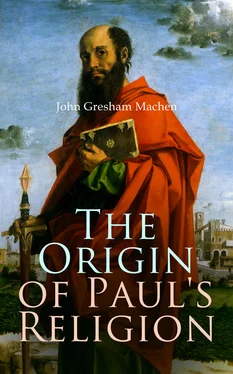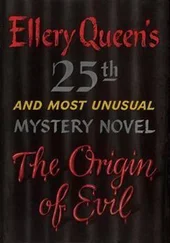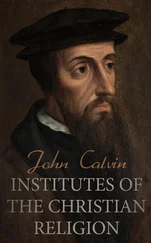In very recent years, another account of the origin of Paulinism is becoming increasingly prevalent. This account agrees with Wrede in rejecting the liberal derivation of the religion of Paul from an impression of the historical person of Jesus. But it differs from Wrede in its view of the source from which the religion of Paul is actually to be derived. According to this latest hypothesis, Paulinism was based not upon the pre-Christian Jewish conception of the Messiah, but upon contemporary pagan religion.
This hypothesis represents the application to the problem of Paulinism of the method of modern comparative religion. About twenty years ago that method began to be extended resolutely into the New Testament field, and it has been becoming increasingly prevalent ever since. Despite the prevalence of the method, however, and the variety of its application, one great comprehensive work may now fairly lay claim to be taken as summing up the results. That work is the book of W. Bousset, entitled "Kyrios Christos," which appeared in 1913. [12]It is perhaps too early as yet to estimate the full importance of Bousset's work. But unless all indications fail, the work is really destined to mark an epoch in the history of New Testament criticism. Since the days of F. C. Baur, in the former half of the nineteenth century, there has been no such original, comprehensive, and grandly conceived rewriting of early Christian history as has now appeared in Bousset's "Kyrios Christos." The only question is whether originality, in this historical sphere, is always compatible with truth.
According to Bousset, the historicity of Jesus is to be maintained; Jesus was really a religious teacher of incomparable power. But Bousset rejects much more of the Gospel account of Jesus' life than is rejected in the ordinary "liberal" view; Bousset seems even to be doubtful as to whether Jesus ever presented Himself to His disciples as the Messiah, the Messianic element in the Gospels being regarded for the most part as a mere reflection of the later convictions of the disciples. After the crucifixion, the disciples in Jerusalem, Bousset continues, were convinced that Jesus had risen from the dead, and that He was truly the Messiah. They conceived of His Messiahship chiefly under the category of the "Son of Man"; Jesus, they believed, was the heavenly being who in their interpretation of the Book of Daniel and in the apocalypses appears in the presence of the supreme God as the one who is to judge the world. This heavenly Son of Man was taken from them for a time, but they looked with passionate eagerness for His speedy return. The piety of the early Jerusalem Church was therefore distinctly eschatological; it was founded not upon any conviction of a present vital relation to Jesus, but on the hope of His future coming. In the Greek-speaking Christian communities of such cities as Antioch and Tarsus, Bousset continues, an important additional step was taken; Jesus there began to be not only hoped for as the future judge but also adored as the present Lord. He came to be regarded as present in the meetings of the Church. The term "Lord," with the conception that it represents, was never, according to Bousset, applied to Jesus in the primitive Palestinian Church; it was first applied to Him in Hellenistic Christian communities like the one at Antioch. And it was there derived distinctly from the prevalent pagan religion. In the type of religion familiar to the disciples at Antioch, the term "Lord" was used to denote the cult-god, especially in the so-called "mystery religions"; and the Antioch disciples naturally used the same term to designate the object of their own adoration. But with the term went the idea; Jesus was now considered to be present in the meetings of the Church, just as the cult-gods of the pagan religions were considered to be present in the worship practiced by those religions. An important step had been taken beyond the purely eschatological piety of the Jerusalem disciples.
But how about Paul? Here is to be found one of the boldest elements in all the bold reconstruction of Bousset. Paul, Bousset believes, was not connected in any intimate way with the primitive Christianity in Palestine; what he "received" he received rather from the Hellenistic Christianity, just described, of cities like Antioch. He received, therefore, the Hellenistic conception of Jesus as Lord. But he added to that conception by connecting the "Lord" with the "Spirit." The "Lord" thus became present not only in the meetings of the Church for worship but also in the individual lives of the believers. Paulinism as it appears in the Epistles was thus complete. But this distinctly Pauline contribution, like the conception of the Lordship of Jesus to which it was added, was of pagan origin; it was derived from the mystical piety of the time, with its sharp dualism between a material and a spiritual realm and its notion of the transformation of man by immediate contact with the divine. Paulinism, therefore, according to Bousset, was a religion of redemption. But as such it was derived not at all from the historical Jesus (whose optimistic teaching contained no thought of redemption) but from the pessimistic dualism of the pagan world. The "liberal" distinction between Pauline religion and Pauline theology, the attempt at saving Paul's religion by the sacrifice of his theology, is here abandoned, and all that is most clearly distinctive of Paulinism (though of course some account is taken of the contribution of his Jewish inheritance and of his own genius) is derived from pagan sources.
The hypothesis of Bousset, together with the rival reconstructions which have just been outlined, will be examined in the following discussion. But before they can be examined it will be necessary to say a word about the sources of information with regard to the life of Paul. No discussion of the literary questions can indeed here be undertaken. Almost all that can be done is to set forth very briefly the measure of agreement which has been attained in this field, and the bearing of the points that are still disputed upon the subject of the present investigation.
The sources of information about Paul are contained almost exclusively in the New Testament. They are, first, the Pauline Epistles, and, second, the Book of Acts.
Four of the Pauline Epistles—Galatians, 1 and 2 Corinthians, and Romans—were accepted as certainly genuine by F. C. Baur, the founder of the "Tübingen School" of criticism in the former half of the nineteenth century. This favorable estimate of the "major epistles" has never been abandoned by any number of really serious historians, and three of the other epistles—1 Thessalonians, Philippians, and Philemon—have now been added to the "homologoumena." Seven epistles, therefore, are accepted as genuine to-day by all historians except a few extremists. Of the remaining epistles, Colossians is accepted by the majority of investigators of all shades of opinion, and even in the case of 2 Thessalonians and Ephesians, the acceptance of the hypothesis of genuineness is no longer regarded as a clear mark of "conservatism," these two epistles being regarded as genuine letters of Paul by some even of those who are not in general favorable to the traditional view of the New Testament.
With regard to the Pastoral Epistles—1 and 2 Timothy and Titus—the issue is more clearly drawn. These epistles, at least in their entirety, are seldom regarded as genuine except by those who adopt in general the traditional view of the New Testament and the supernaturalistic conception of the origin of Christianity. That does not mean that the case of the Pastoral Epistles is desperate—certainly the present writer is firmly convinced that the epistles are genuine and that a denial of their genuineness really impoverishes in important respects our conception of the work of Paul—but it does mean that with regard to these epistles the two great contending views concerning the New Testament come into sharp conflict; common ground, in other words, cannot here be found, as in the case of the major epistles, between those who hold widely divergent views as to the origin of Christianity.
Читать дальше












